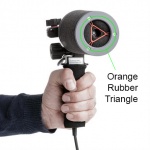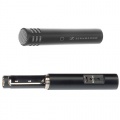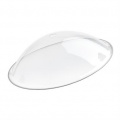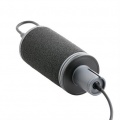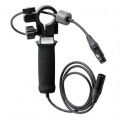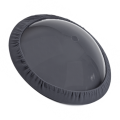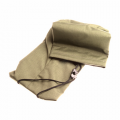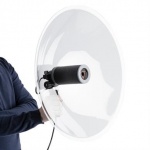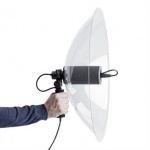Parabolic Microphone Kit Gear Guide
Contents
INTRO
This kit requires a proficiency, which you can find [[1]]
The Telinga Parabolic Microphones are designed to be reliable, lightweight and very easy to use. The primary use of this parabolic microphone is wildlife audio recording and it has been developed in co-operation with ornithologists, wildlife filmmakers and researchers in the field of bio-acoustics. It is specifically made to reduce wind and handling noise as well as inherent noise from the microphone and amplifiers. The dish funnels sound into the microphone, which allows for recording sources from farther distances.
CARE
DO NOT:
Submerge the microphone in water
Drop it
Expose it to extreme weather conditions
Expose it to extreme heat or cold
Use excessive force
Point the parabola towards the sun
Store the parabolic kit face down on the ground
Dish
Store the dish with the opening down on a flat surface. Clean the dish only with soap and water. Do not use detergents. The dish can be rolled into a “cigar-like” shape with a diameter of about 6inches. If put on a flat surface and left for a while it will regain its shape. If the dish must be used instantly, however, you can make a cross of adhesive tape over the opening.
Mic
NEVER load any microphone into the zeppelin by pushing the capsule end through the orange rubber triangle. In the forward method (explained below), with the microphone facing outward from the dish, the tip of the capsule should never extend through the triangle. The microphone should only be loaded through the back of the handle.
IN THE KIT
Omnidirectional Sennheiser ME62 w/K6 module
Large 22” clear parabolic dish
Zeppelin
Pistol grip handle: equipped with adjustable XLR, shockmount, and stopper
Windcoat
Dish bag
Tripod mount
SET-UP
DISH
- Line the zeppelin up with the circular opening on the dish on the concave side.
- Place the other half of the zeppelin (the grey tube) on the opposite side.
- Twist the tube until it screws into the zeppelin securely.
- Fasten the pistol grip handle onto the grey tube using the wing-bolt to loosen/tighten the opening accordingly.
MIC
This parabolic microphone can be used one of two ways: with the microphone facing forwards or backwards. The different methods allow for various sound styles.
Forwards
This is the “old way” to use a parabolic mic. In this traditional way, the mic capsule will point outward from the dish. The mic should not extend past the orange rubber triangle at the front of the zeppelin.
Set-up:
- With the capsule facing forwards (outwards from the dish), insert the mic into the back of the handle/tube.
- Push the mic into the zeppelin. Do not let it extend past the orangle triangle at the front of the zeppelin opening.
- Connect the XLR to the back of the microphone and attach to recording device.
Backwards
The “new” way to use this mic. The mic capsule can be loaded in the zeppelin the opposite way, with the capsule pointed backwards toward the dish. Do not load the mic in through the front of the zeppelin – as with the other method, the mic should always be loaded in through the back. Note: The stopper on the handle can only be used when the mic is loaded in backwards.
Set-up:
- Push the XLR into the zeppelin. This needs to be done before you insert the mic.
- With the capsule facing backwards (towards the dish), insert the mic into the back of the handle/tube. You can use the mic to push the XLR through the end of the zeppelin. The back of the mic should extend past the rubber triangle along with the XLR.
- Push the stopper into the back of the handle/tube. DO NOT FORCE the stopper against the capsule.
- Connect the XLR to the back of the mic. DO NOT STRESS THE XLR CONNECTION. Feed enough of the XLR through so that it isn’t pulled tight, but also so that there isn’t too much slack.
Placement method will be dependent on your audio recording needs. A good way to set your microphone up is to place a constant sound source (such as a radio), stand 80 feet away, point the microphone at the source and then make adjustments with the mic back and forth until you reach the strongest signal.
ADDITIONAL INFO
The stopper prevents unwanted noise from travelling through the tube. It cannot be used in the forwards method with the include mic, as the mic is too long and shouldn’t extend past the zeppelin.
You can place the windcoat on the front of the dish for further wind protection.

